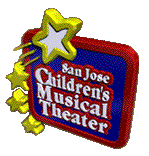|
TADA was a remarkable program that engaged
hundreds of children from around the world to create new musical
theater.
It used online collaboration—live chats, electronic bulletin
boards, email and interactive web sites—to bring individual
children and classrooms together with each other and with theater
professionals who turned their ideas into a fully-staged professional
production.
Children, some isolated by illness or geography, expressed their
hopes, fears, and visions for the future. They were involved in
all facets of the shows’ creation, including research, characterization,
plot development, and the writing of the dialogue, lyrics, and music.
TADA was a program of of Children’s
Musical Theater San José (CMTSJ) from 1998–2003, and
produced five shows.
Richard was commissioned to write three shows as part of TADA:
- 2101, a full-length
musical about life 100 years in the future
- A
Little Princess, the fourth new TADA musical, and the
first adaptation, and
- Persephone, a show about the goddess of the underworld
in Greek mythology.
References to TADA have been removed CMTSJ’s
web site. There’s a little bit of information about 2101
at the Digital Performance
Archive site.
The following has been re-posted from its original
location with permission of the Virtual
Volunteering Project, part of the RGK Center for Philanthropy
and Community Service, at the University of Texas at Austin’s
LBJ School of Public Affairs.
The following article refers to San Josť Children’s Musical
Theater (SJCMT), which was correct when the article was written;
they have since changed their name to Children’s
Musical Theater San José (CMTSJ).
 |
|
The Theater as Digital Activity (TADA)
program at San Josť Children’s Musical Theater is a perfect
example of an organization fully and successfully integrating
virtual volunteering and online service delivery into what it
already does well. |
by Tegan McLane, Theater as Digital Activity (TADA) Coordinator
The first TADA project took place over a whole year: 45 young people
throughout the U.S. with serious illnesses and disabilities and
linked via ConvoNation worked online with the San Josť Children’s
Musical Theater (SJCMT). They shared fears and frustrations with
young actors in San Josť, the theater artistic director Kevin Hauge,
and playwright and TADA coordinator Tegan McLane.
The result was Pulse, the Rhythm of Life, an original musical
which premiered in May 1998 in San Josť, with young actors protraying
characters that were “a mosaic of wounded, hurting kids whose
loneliness is lessed by a keyboard and the knowledge that other
children similarly suffer,” according to a feature article
in the San José Mercury News.
Just before the production was launched, Tegan noted, “The
new virtual component allows us to be even more inclusive, welcoming
kids who are isolated by sickness or geographic distance and sharing
the magic of theater with them.” SJCMT is committed to providing
excellent, accessible musical theater training for youth, with high-quality
performances for families and the entire community. TADA is an extension
of this endeavor, and is already working on more computer-born,
collaborative stage shows.
“Our second project is called OUR TREE: The Family Chronicles
and we’ll be working online with students around the country
to write another original musical, premiering in the year 2000,”
Tegan added.
“Our online participants, who are mostly junior high, high
school and college age kids, are considered both clients and volunteers.
The kids contribute ideas to our original musicals via the internet,
email and live chats.”
TADA has an outline of OUR TREE: The Family Chronicles
posted on its web site, and is inviting feedback from online volunteers
about these scenes. The countdown for TADA’s third original
musical inspired by youth online begins in the Fall of 1999 as well.
The new show will be set in the year 2101 and online contributors
will offer suggestions about what the world will be like a hundred
years from now.
They also incorporate volunteer involvement with regular season
shows at SJCMT. Each week until the production, Director Kevin Hauge
and members of his production team pose research questions and invite
input on certain aspects of the show. For example, during the first
week, as Kevin plans the staging for Eva’s funeral scene,
the online volunteer dramaturgs were asked to use the Internet to
uncover details about Eva Peron’s funeral, including any special
customs or state funeral traditions, decor and who was in attendance.
“The site is available in both English and Spanish, thanks
to the dedicated work of our volunteer translators,” says Tegan.
A SJCMT parent heads the translation team, with additional support
from a Spanish student in Florida who is volunteering online.
SJCMT also involves volunteers virtually in HTML programming (one
online volunteer designs and produces all of the theater’s
performance programs) , and uses its web site to recruit volunteers
for offline tasks. The theater has started doing two monthly e-mail
newsletters—one for kids and one for adults (and all volunteers).
SJCMT/TADA is exploring ways for parents whose work prevents them
from volunteering onsite to be able to volunteer virtually.
Tegan prepared detailed information to help other organizations
wanting to work with volunteers and clients via chat rooms, based
on her own experiences with TADA. This information focuses on the
human aspects that make such interactions successful, rather than
the technology. The VV Project combined this information with other
material for a
chat resource page.
|
